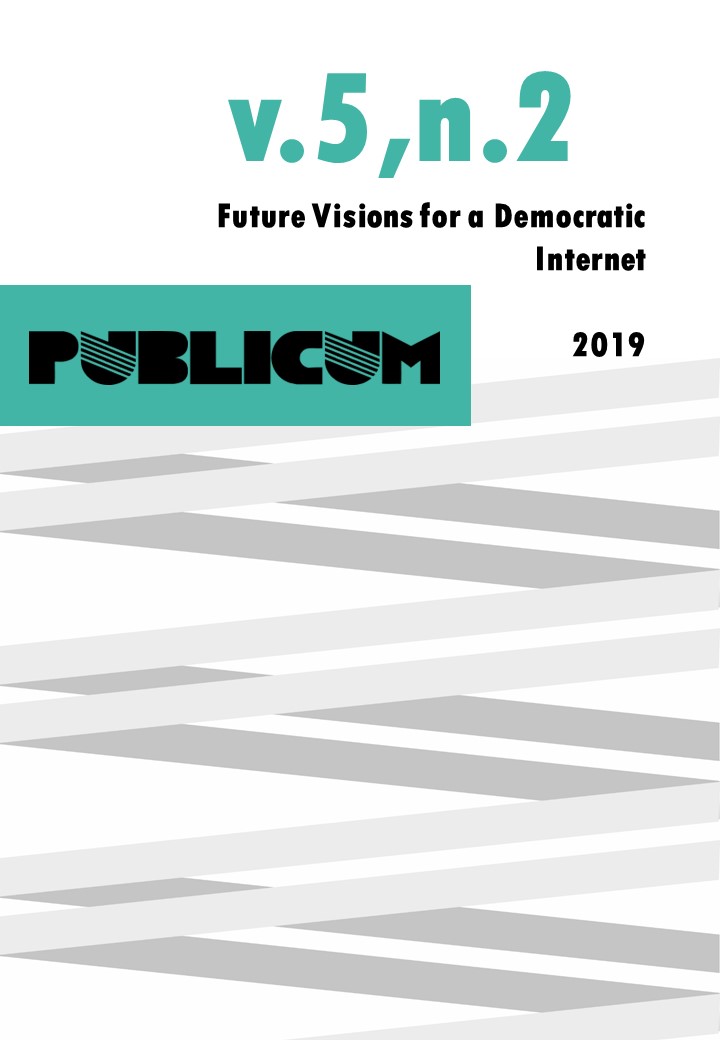Open for whom? The role of intermediaries in data publication | Abertos para quem? O papel dos intermediários na publicação de dados
DOI:
https://doi.org/10.12957/publicum.2019.47205Keywords:
Data publication, Role of intermediaries, Open government. | Publicação de dados, Papel dos intermediários, Governo aberto..Abstract
Abstract: For about ten years, governments have been experimenting with ‘open government’ and ‘open data’. Stimulating a transparent and open government by publishing data is thought to be a new phase in the democratization and emancipation of citizens. Open data enthusiasts (sometimes) argue that these advantages are to be achieved through the dissemination of data to ‘intermediaries’, and not necessarily to the average citizen. Groups like journalists, data-analysts and activists are considered to be the pathways through which governmental data is and should be transformed into information and communicated to the public. Within the legal environment of access to government information, the notion that intermediaries have a more pressing claim to government information seems to allow for an analogy to the so-called ‘public watchdog’ approach the ECtHR has taken under article 10, related to freedom of expression. Article 10’s remit can cover a limited right to information, but only for those performing this watchdog function. However, in many of the laws dealing more directly with government information, the implicit or explicit criterion is that ‘anyone’ has the same access in principle. In this essay, we analyse the role and function(ing) of intermediaries in the context of Dutch open data policy from two different perspectives. In our legal analysis, we explore the linkages between various international levels touching upon a right to information and Dutch open data policy. From the perspective of political philosophy, we question the distinction drawn between intermediaries and the public, in terms of data and information dissemination. To what extent does it make sense to differentiate between citizens on the basis of their function or job? What is the moral difference between a journalist and a citizen in this respect? The expectations of access to government information are sky-high. To what extent are we subcontracting them?
Resumo: Por cerca de dez anos, os governos vêm experimentando as ideias de "governo aberto" e "dados abertos". Pensa-se que estimular um governo transparente e aberto através da publicação de dados seja uma nova fase na democratização e emancipação dos cidadãos. Entusiastas de dados abertos (às vezes) argumentam que essas vantagens devem ser alcançadas por meio da disseminação de dados para 'intermediários' e não necessariamente para o cidadão comum. Grupos como jornalistas, analistas de dados e ativistas são considerados os caminhos pelos quais os dados governamentais são e devem ser transformados em informações e comunicados ao público. No regime legal de acesso às informações do governo, a noção de que os intermediários têm uma reivindicação mais premente das informações do governo parece permitir uma analogia à chamada abordagem de "vigilância pública" que o Tribunal Europeu de Direitos Humanos adotou no artigo 10, relacionado à liberdade de expressão. O mandamento do artigo 10 pode abranger um direito limitado à informação, mas apenas para aqueles que executam essa função de fiscalização. No entanto, em muitas das leis que lidam mais diretamente com informações do governo, o critério implícito ou explícito é que qualquer pessoa tenha o mesmo acesso em princípio. Neste artigo, analisamos o papel e a função de intermediários no contexto da política holandesa de dados abertos a partir de duas perspectivas diferentes. Em nossa análise jurídica, exploramos os vínculos entre vários níveis internacionais relacionados ao direito à informação e à política de dados abertos da Holanda. Do ponto de vista da filosofia política, questionamos a distinção estabelecida entre intermediários e público em termos de divulgação de dados e informações. Até que ponto faz sentido diferenciar os cidadãos com base em sua função ou trabalho? Qual é a diferença moral entre jornalista e cidadão a esse respeito? As expectativas de acesso às informações do governo são altíssimas. Até que ponto estamos subcontratando-os?
Downloads
Published
How to Cite
Issue
Section
License
The author(s) of the paper declare(s) to know and agree to the following rules:
1) The author(s) undertook the work presented to the journal, being entirely responsible for the ideas and concepts therein transmitted, which do not necessarily correspond to the point of view of Publicum’s Editors.
2) The ethical principles alluded to in the evaluation policy of the journal [RDN1] were met in the conduction of the work presented to submission.
3) The author(s) assume(s) authorship and responsibility for their work, declaring that it does not infringe any third party intellectual property rights.
4) The author(s) take(s) full responsibility for moral or patrimonial damages that the distribution of the work may generate to third parties.
5) The author(s) grant(s) the journal the rights to reproduce, edit and first publish the paper in any media – in particular in digital form – in an electronic archive on the Internet.
6) The author(s) confer(s) the right to the editors to modify the text submitted, without prejudice of its contents, when necessary to standardize the presentation of the works and to meet the norms of the journals’ own edition.
7) The author(s) agree(s) to the final form of the paper approved by the journal.
8) The author(s) authorize(s) the disclosure of the paper in the channels of communication of the Faculty of Law of UERJ.
9) The author(s) agree(s) with the reproduction of short extracts from the paper in other UERJ publications.
10) The author(s) recognize(s) that, through the abovementioned assignment and authorizations, he/she/they will not receive payment under any modality, meaning these will have the nature of scientific collaboration.
11) The author(s) is(are) aware that publication of the work may be refused if it is not considered appropriate, for any reason, whatsoever, and such refusal does not create responsibility and/or burdens of any kind to the journal or UERJ.
[RDN1]Ver COPE.

Publicum está licenciado com uma Licença Creative Commons Atribuição-NãoComercial 4.0 Internacional.

